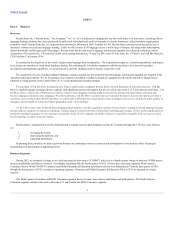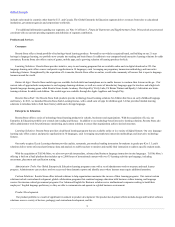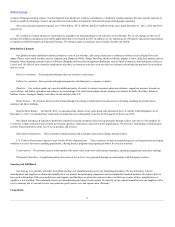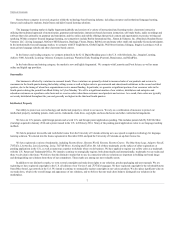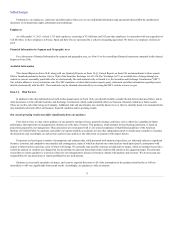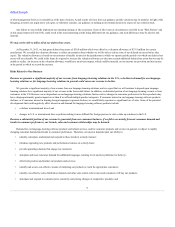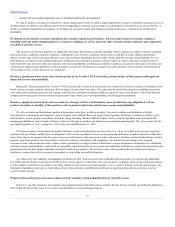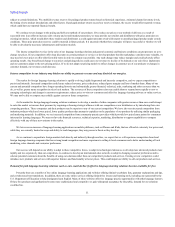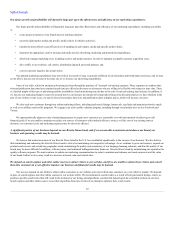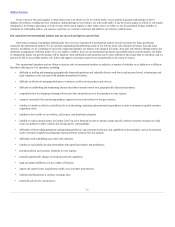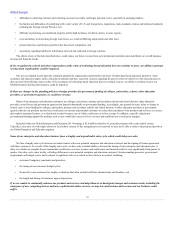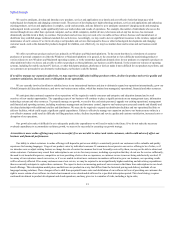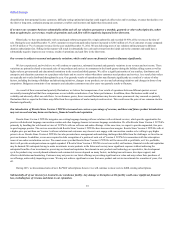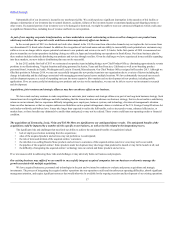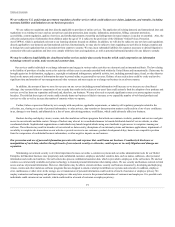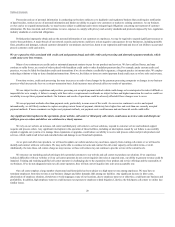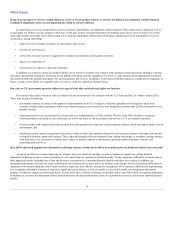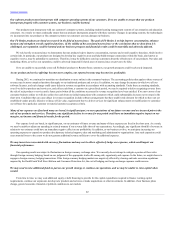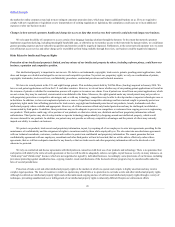Rosetta Stone 2013 Annual Report Download - page 15
Download and view the complete annual report
Please find page 15 of the 2013 Rosetta Stone annual report below. You can navigate through the pages in the report by either clicking on the pages listed below, or by using the keyword search tool below to find specific information within the annual report.
Table of Contents
•difficulties in enforcing contracts and collecting accounts receivable, and longer payment cycles, especially in emerging markets;
•the burden and difficulties of complying with a wide variety of U.S. and foreign laws, regulations, trade standards, treaties and technical standards,
including the Foreign Corrupt Practices Act;
•difficulty in protecting our intellectual property and the high incidence of software piracy in some regions;
•costs and delays in downsizing foreign work forces as a result of differing employment and other laws;
•protectionist laws and business practices that favor local competitors; and
•uncertainty regarding liability for information retrieved and replicated in foreign countries.
The effects of any of the risks described above could reduce our future revenue from our international operations and could harm our overall business,
revenue and financial results.
If the recognition by schools and other organizations of the value of technology-based education does not continue to grow, our ability to generate
revenue from organizations could be impaired.
Our success depends in part upon the continued adoption by organizations and potential customers of technology-based education initiatives. Some
academics and educators oppose online education in principle and have expressed concerns regarding the perceived loss of control over the education process
that can result from offering courses online. If the acceptance of technology-based education does not continue to grow, our ability to continue to grow our
Global Enterprise & Education business could be impaired.
If there are changes in the spending policies or budget priorities for government funding of colleges, universities, schools, other education
providers, or government agencies, we could lose revenue.
Many of our enterprise and education customers are colleges, universities, primary and secondary schools and school districts, other education
providers, armed forces and government agencies that depend substantially on government funding. Accordingly, any general decrease, delay or change in
federal, state or local funding for colleges, universities, primary and secondary schools and school districts, or other education providers or government
agencies that use our products and services could cause our current and potential customers to reduce their purchases of our products and services, to exercise
their right to terminate licenses, or to decide not to renew licenses, any of which could cause us to lose revenue. In addition, a specific reduction in
governmental funding support for products such as ours would also cause us to lose revenue and could hurt our overall gross margins.
Included within our Global Enterprise and Education 2013 bookings is $2.0 million related to a Lexia pilot program with a state school system.
Typically, Lexia sales are with single schools or local school systems. If this arrangement is not renewed we may not be able to achieve the projected growth in
our Global Enterprise and Education segment.
Some of our enterprise and education business faces a lengthy and unpredictable sales cycle, which could delay new sales.
We face a lengthy sales cycle between our initial contact with some potential enterprise and education customers and the signing of license agreements
with these customers. As a result of this lengthy sales cycle, we have only a limited ability to forecast the timing of such enterprise and education sales. A
delay in or failure to complete license transactions could cause us to lose revenue, and could cause our financial results to vary significantly from quarter to
quarter. Our sales cycle varies widely, reflecting differences in our potential enterprise and education customers' decision-making processes, procurement
requirements and budget cycles, and is subject to significant risks over which we have little or no control, including:
• customers' budgetary constraints and priorities;
•the timing of our customers' budget cycles;
•the need by some customers for lengthy evaluations that often include both their administrators and faculties; and
•the length and timing of customers' approval processes.
If we are unable to continually enhance our products and services and adapt them to technological changes and customer needs, including the
emergence of new computing devices and more sophisticated online services, we may lose market share and revenue and our business could
suffer.
14


